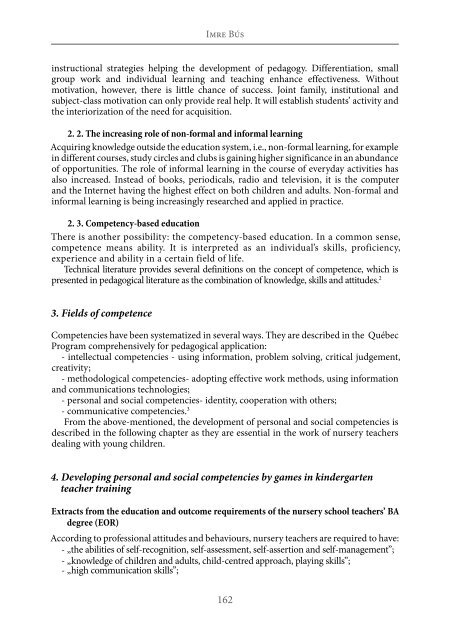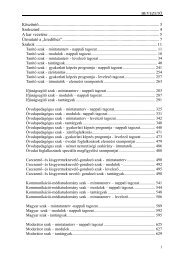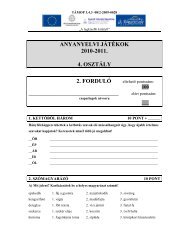ACTA SZEKSZARDIENSIUM - Pécsi Tudományegyetem Illyés Gyula ...
ACTA SZEKSZARDIENSIUM - Pécsi Tudományegyetem Illyés Gyula ...
ACTA SZEKSZARDIENSIUM - Pécsi Tudományegyetem Illyés Gyula ...
Create successful ePaper yourself
Turn your PDF publications into a flip-book with our unique Google optimized e-Paper software.
Imre Bús<br />
instructional strategies helping the development of pedagogy. Differentiation, small<br />
group work and individual learning and teaching enhance effectiveness. Without<br />
motivation, however, there is little chance of success. Joint family, institutional and<br />
subject-class motivation can only provide real help. It will establish students’ activity and<br />
the interiorization of the need for acquisition.<br />
2. 2. The increasing role of non-formal and informal learning<br />
Acquiring knowledge outside the education system, i.e., non-formal learning, for example<br />
in different courses, study circles and clubs is gaining higher significance in an abundance<br />
of opportunities. The role of informal learning in the course of everyday activities has<br />
also increased. Instead of books, periodicals, radio and television, it is the computer<br />
and the Internet having the highest effect on both children and adults. Non-formal and<br />
informal learning is being increasingly researched and applied in practice.<br />
2. 3. Competency-based education<br />
There is another possibility: the competency-based education. In a common sense,<br />
competence means ability. It is interpreted as an individual’s skills, proficiency,<br />
experience and ability in a certain field of life.<br />
Technical literature provides several definitions on the concept of competence, which is<br />
presented in pedagogical literature as the combination of knowledge, skills and attitudes. 2<br />
3. Fields of competence<br />
Competencies have been systematized in several ways. They are described in the Québec<br />
Program comprehensively for pedagogical application:<br />
- intellectual competencies - using information, problem solving, critical judgement,<br />
creativity;<br />
- methodological competencies- adopting effective work methods, using information<br />
and communications technologies;<br />
- personal and social competencies- identity, cooperation with others;<br />
- communicative competencies. 3<br />
From the above-mentioned, the development of personal and social competencies is<br />
described in the following chapter as they are essential in the work of nursery teachers<br />
dealing with young children.<br />
4. Developing personal and social competencies by games in kindergarten<br />
teacher training<br />
Extracts from the education and outcome requirements of the nursery school teachers’ BA<br />
degree (EOR)<br />
According to professional attitudes and behaviours, nursery teachers are required to have:<br />
- „the abilities of self-recognition, self-assessment, self-assertion and self-management”;<br />
- „knowledge of children and adults, child-centred approach, playing skills”;<br />
- „high communication skills”;<br />
162




